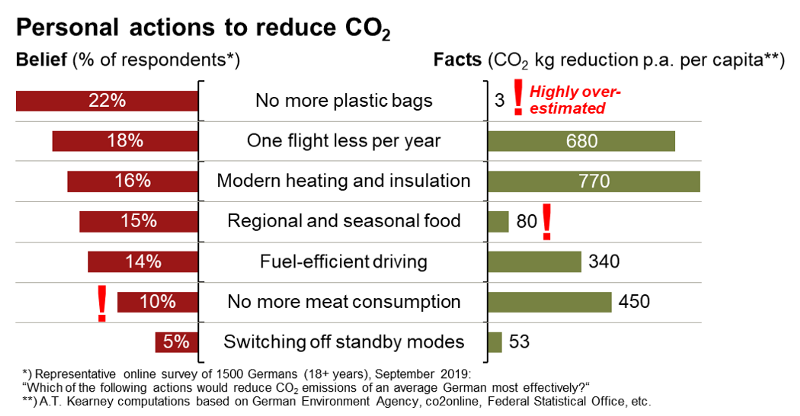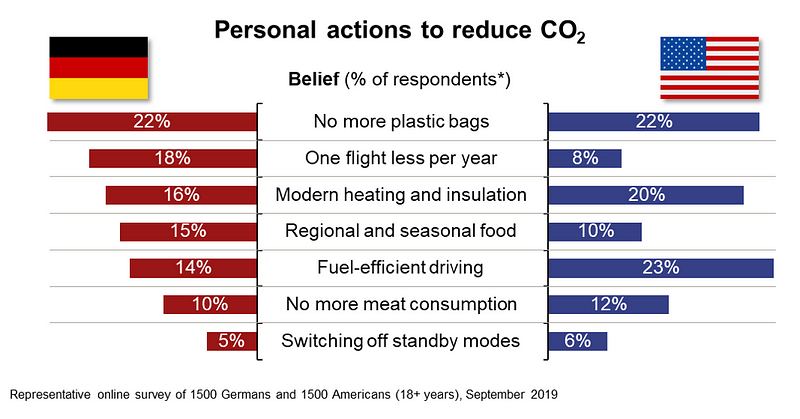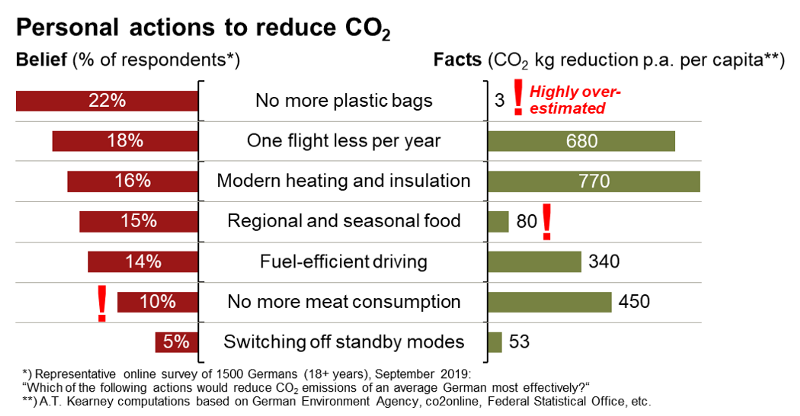Which personal action has the strongest impact on reducing the CO2 footprint of an average American or German? Turns out this question is surprisingly difficult to answer for most of us. And what are the next best five or ten things we should do to cut CO2? There is surprisingly little guidance out there. Because of that, I fear that we may not manage to cut emissions as much as we have to. That’s why Carsten and I did the legwork for you!
I have to admit that Greta got to me. Perhaps because I also have a daughter some consider to be on the spectrum as well (remember Greta’s hate speech at the UN?…“how dare you”…we get this regularly when we ask our daughter to lay the table). So what does a management consultant do if he wants to take personal action on CO2? Look for a concise, quantitative, prioritized list of key drivers that he can select from (since CO2 footprints differ by country, we looked for German information). There is a ton of information out there, but it is usually in one of the following categories:
- The “Everything-under-the-sun” list gives you too many items and does not prioritize even though the effects may differ by an order of magnitude.
- The “Energy saver” list has useful personal actions but focuses only on one aspect of your life, usually heating and/or electricity.
- The Calculator enables you to get to the bottom of your very own personal profile and simulate in great detail what effect individual actions would have. Classic German over-engineering that only a tiny group of zealots will ever use.
- The “Kill-yourself-and-your-family” list is very close to what we had in mind, but lists as the most important driver “Have one fewer child”. Seriously?! This is as factually correct as saying that if you kill yourself right now, you will achieve the biggest possible CO2 saving. Needless to say, including this lever in the infographic is a very dumb idea because it creates a backlash and destroys good intentions.
But thanks to all these lists and useful calculators, we were able to come up with the following overview quickly. It is still work-in-progress, not perfect at all, and sometimes we have conflicting data points, but hey, it’s a start.

We have grouped the actions into
- what we can start doing today — in other words, actions that don’t take too much effort, like fuel-efficient driving
- what takes more planning and preparation, like reducing the number of flights you take or switching to green electricity
- what may take considerable investments, like switching to modern heating and insulating your home better.
As a vegetarian household with top-notch heating and insulation, with an electric car, green electricity, and no daily car commute, I can check off many actions on that list. However, some drivers were new to me, like washing clothes in cold water. The good news is that if I implement all these levers, I will achieve about 75% of the reduction target defined by the government for 2030! How cool is that?!
And now comes the bad news.
We asked 1500 Americans and 1500 Germans to select from a list of seven personal actions the one that has the strongest impact on reducing the CO2 footprint of an average person. Here comes the list:
- Energy-efficient heating/cooling/insulation
- Avoid one return trip by aircraft per year
- Eat less red meat
- Fuel-efficient driving
- Buy local and seasonal produce
- Unplug unused electronics to stop standby
- No more plastic bags
We presented the list to respondents in a randomized order, but the list above is in descending order of impact. For example, in Germany, the impact of energy-efficient heating & insulation on our CO2 footprint is a whopping 250 times bigger than stopping to use plastic bags.
Guess which action was selected most often in Germany? “No more plastic bags”! Seriously?!
Here is the drama in all its gory details:

We were hoping that this is due to Germany’s unique obsession with recycling trash since the 1980s. But “no more plastic bags” actually made it to number 2 on the list in the US as well, very close behind fuel-efficient driving. Here is the comparison between both countries:

It is difficult to say who is more clueless because both countries have their specific blind spots: That “one flight less per year” comes out so low in the US is just as ridiculous as the fact that meat consumption is not seen as a source of CO2 in Germany.
I wish I had taken the survey myself before doing the math on the actual drivers. I am certain I had my fair share of ignorance! For example, I grossly overestimated the effect of having no daily commute to work.
But we are not here to poke and pry, but rather to drive action! So now that I know all the numbers, I have pledged to substantially reduce my flights!

